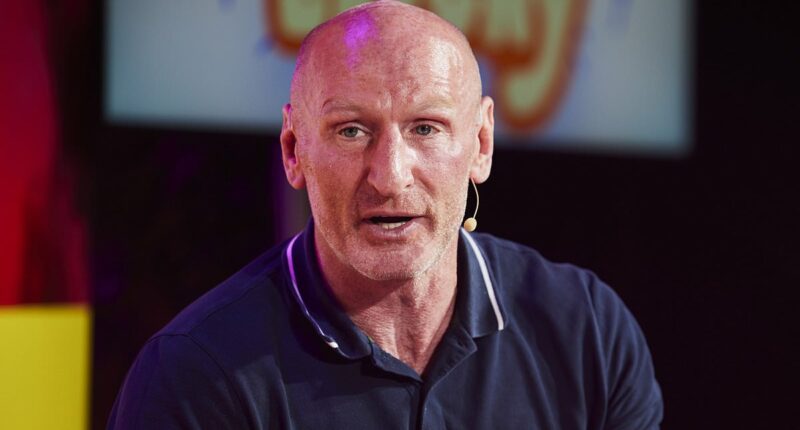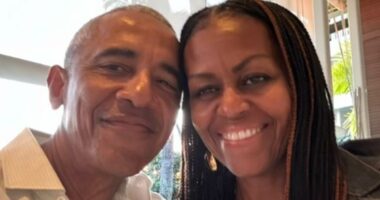Share this @internewscast.com
Society is still in a ‘s*** place’ when it comes to tackling homophobia and the stigma around HIV, Gareth Thomas has claimed.
In an interview with the Daily Mail podcast The Life of Bryony, Gareth Thomas, 51, discussed the ongoing challenges despite recent advancements and shared some of the hateful messages he continues to receive.
Thomas, who once captained both Wales and the British and Irish Lions, marked his career with 100 caps as captain of the Welsh national team.
Making history in 2009, Thomas became rugby union’s first openly gay professional player. A decade later, in 2019, he disclosed his HIV positive status, emphasizing that his undetectable viral load means he is not infectious.
You can listen to this episode of The Life of Bryony by clicking the player below or here
‘We’ve come a long way’, Thomas told Mail columnist Bryony Gordon.
‘But the reality is, we were in a really, really s*** place and now we’re just in a really s*** place.
‘For example, can anyone name five openly gay participants in male sport? I sure as hell can’t, and I know my sport as well as anyone.
‘Every time I step onto the field, people only see my sexuality. That’s not how I want to be viewed. I’ve got skills, I’ve got character – that’s what defines me.’
Since going public about his diagnosis, Thomas has championed HIV awareness and acceptance.
In the conversation, Thomas referred to a statistic indicating that over the next two decades, around 400,000 individuals may die due to misinformation and prejudices about the disease rather than the disease itself.

Society is still in a ‘s*** place’ when it comes to tackling homophobia and the stigma around HIV , Gareth Thomas has claimed

Thomas captained both Wales and the British and Irish Lions during his illustrious playing career, becoming the Welshman to be captained 100 times by his national team.

Speaking to Daily Mail columnist bryony Gordon, Thomas, 51, said that despite recent progress, major challenges remain
The former rugby player agreed with podcast host Bryony that much of this stigma stems from the ‘terrifying’ way HIV was portrayed in the 1980s.
Thomas described how ignorance about the disease, infused with homophobia, has impacted his life.
‘People can still be discriminatory, without actually making a homophobic or racist slur’, he said.
‘I’ve walked out of a bathroom before, when somebody was waiting outside. I’ve heard them then go over to the waiter and ask whether they can use another toilet, because they think I can transmit the disease like that.
‘I have been with a group of friends, and I’ve picked up somebody’s glass by mistake… you can see this uneasiness – they won’t drink from that glass again.
‘People will say to my partner Steve when I’m with him: ‘God you’re so brave, you’re a star. You deserve a medal for marrying Gareth’ – just because of my medical history.
‘I have also been spat at in the street… there were two young lads who walked up to me the other day and called me an AIDS spreader.’
Medical advancements over the last decade mean that most people who contract HIV will live long and full lives.

Since going public about his diagnosis, Thomas has championed HIV awareness and acceptance

Thomas described how ignorance about the disease, infused with homophobia, has impacted his life

Gareth Thomas: ‘Every time I go out on the field, I will be defined by my sexuality. I don’t want it to be like that.’ Listen here
New treatments also mean transmission becomes incredibly unlikely for those on effective medication.
The worst outcomes typically affect those diagnosed late, either through lack of knowledge about symptoms or fear of discrimination.
The same prejudices that fuel HIV discrimination also drive homophobia in sport, where Thomas says little has changed since his playing days.
He said: ‘Nothing has changed from when I was a 16-year-old kid, sat in a changing room and being told if you can’t run, you’re a f*****.
‘That’s because nobody is being proactive… we have to be better.
‘I remember when I was with the union after coming out, they called me and said – we’ll make sure you’re protected.
‘My words to them were, there’s nothing more you can do – but there was a load you could have done.
‘Being proactive is creating an environment where somebody doesn’t have to do something drastic, just to get a reaction.’
To listen to Gareth’s full interview, where he debates his playing career and tackling discrimination, search for The Life of Bryony now, wherever you get your podcasts.

















